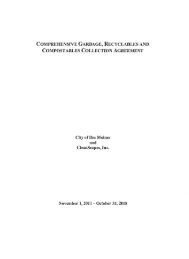CITY OF DES MOINES SHORELINE MASTER PROGRAM
CITY OF DES MOINES SHORELINE MASTER PROGRAM
CITY OF DES MOINES SHORELINE MASTER PROGRAM
Create successful ePaper yourself
Turn your PDF publications into a flip-book with our unique Google optimized e-Paper software.
Des Moines Shoreline Master Program<br />
Dwelling 3 . A building designed exclusively for residential purposes, including one-family,<br />
duplex, townhouse, and multiple dwellings, which is constructed in accordance with the city<br />
buildings and construction code of Des Moines Municipal Code, but not including hotels or<br />
motel units having no kitchens.<br />
Ecological functions 1 . Also referred to as “shoreline functions,” meaning the work performed<br />
or role played by the physical, chemical, and biological processes that contribute to the<br />
maintenance of the aquatic and terrestrial environments that constitute the shoreline's natural<br />
ecosystem.<br />
Ecosystem-wide processes 1 . The suite of naturally occurring physical and geologic processes of<br />
erosion, transport, and deposition; and specific chemical processes that shape landforms within a<br />
specific shoreline ecosystem and determine both the types of habitat and the associated<br />
ecological functions.<br />
Enhancement, wetlands 3 . The manipulation of the physical, chemical, or biological characteristics<br />
of a wetland site to heighten, intensify, or improve specific function(s) or to change the growth stage<br />
or composition of the vegetation present. Enhancement is undertaken for specified purposes such as<br />
water quality improvement, floodwater retention, or wildlife habitat. Enhancement results in a<br />
change in some wetland functions and can lead to a decline in other wetland functions, but does not<br />
result in a gain in wetland acres. Activities typically consist of planting vegetation, controlling<br />
nonnative or invasive species, modifying site elevations or the proportion of open water to influence<br />
hydroperiods, or some combination of these activities.<br />
Environmentally sensitive areas 3 . Any of those areas of the city which are subject to natural<br />
hazards or those landform features which in their natural state carry, hold, or purify water; support<br />
unique, fragile, or valuable natural resources including fish, wildlife, and other organisms and their<br />
habitat; provide flood protection; provide shoreline stabilization; provide ground water recharge;<br />
maintain stream flow; stabilize slope and shoreline bluffs; stabilize soil; and control erosion.<br />
Environmentally sensitive areas include the following landform features: hillsides, wetlands,<br />
streams, areas of special flood hazard, critical aquifer recharge areas, fish and wildlife habitat<br />
conservation areas, and the protective buffers necessary to protect the public health, safety, and<br />
welfare, each as defined in this chapter.<br />
Erosion hazard areas 3 . Areas designated by the “King County Sensitive Areas Map Folio” which,<br />
according to the United States Department of Agriculture Soil Conservation Service Soil Survey,<br />
King County Area Washington issued November 1973, have severe to very severe erosion hazard<br />
potential. These soil map units include Alderwood gravely sandy loam (AgD), Alderwood-Kitsap<br />
soil (AkF), Kitsap silt loam (KpD), and Coastal beaches (Cb).<br />
Essential public facilities 3 . Public facilities that are typically difficult to site, such as airports, state<br />
education facilities, and state or regional transportation facilities as defined in RCW 47.06.140, state<br />
and local correctional facilities, solid waste handling facilities, and in-patient facilities including<br />
substance abuse facilities, mental health facilities, group homes, and secure community transition<br />
facilities as defined in RCW 71.09.020.<br />
KEY: 1. RCW or WAC 2. 1988 SMP Glossary 3. City Zoning Code 4. New Definition<br />
Department of Ecology approval effective November 1, 2010<br />
118 Adopted by City of Des Moines Ordinance No. 1502



